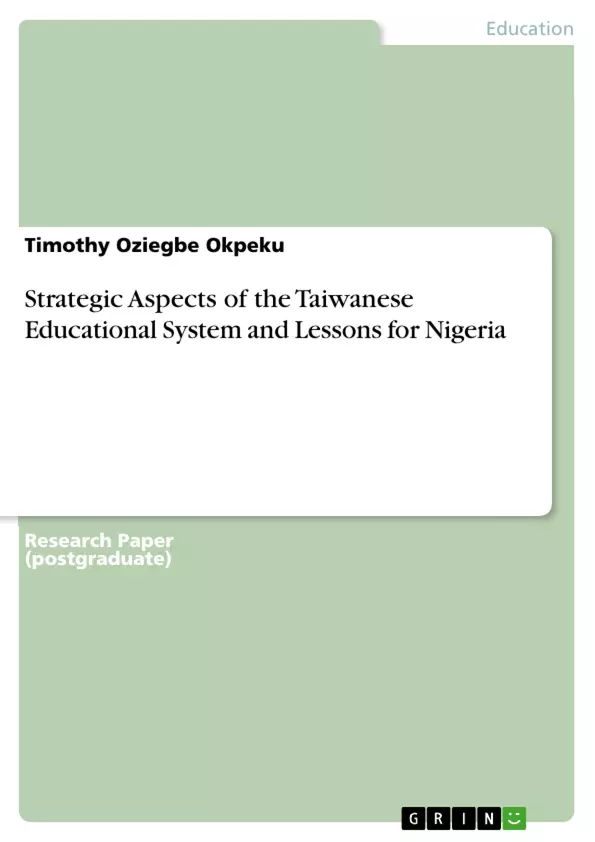The main objective of this study was to examine the perceptions of teachers, school administrators, faculty members, and department chairs on the strategic aspects of the Taiwanese educational system lessons for Nigeria. The study sifted through the debates surrounding the Nigerian education system. Compulsory 12-year schooling, higher education, teacher education, special education, arts education, supplementary, and continuing education were also examined as strategic aspects of the Taiwanese education system.
Because the study sought to view only Taiwanese teachers, school administrators, faculty members, and department chairs about the strategic aspects of the Taiwanese education system, an ex-post facto research design was deemed most appropriate for the study. A questionnaire checklist was used in the study to elicit the perceptions of 179 teachers, school administrators, faculty members, and department chairs in public institutions in Taiwan. The instrument was reviewed by experts for content validity. Based on the judge’s understanding of the strategic aspects of the Taiwanese education system, their views and opinions were sufficiently qualified to provide insight into the reliability of the instrument. Data were analyzed using percent frequency, means, standard deviation, and Pearson Product Moment Correlation Coefficient (PPMC).
Inhaltsverzeichnis (Table of Contents)
- CHAPTER 1 INTRODUCTION
- Background to the Problem
- Problem Statement
- Objective of the Study
- Research Questions
- Assumptions
- Theoretical Framework
- Nature of Study
- Significance of the Study
- Limitations
- Scope/Delimitations
- Organization of the Study
- CHAPTER 2 LITERATURE REVIEW
- Source Strategy
- Conceptual Review
- Nigeria Education System
- Conceptual Review of Key concepts
- Challenges of Nigeria's Education System
- Funding
- Teachers Quality
- Teachers Remuneration
- Instructional Materials
- Infrastructural Facilities
- Lack of Equip Library and Laboratories
- Class Size and Teacher-Students Ratio
- Enrolment
- Parent Teacher Involvement
- Supervision
- School Feeding
- Corruption
- Examination Malpractice
- Political Will
- Insurgency
- Planning
- Summary of the Debate Related to Quality Education in Nigeria
- Taiwanese Education System
- Review of Strategic Aspects of Taiwanese Education Reform
- Compulsory Education Reform
- Higher Education Reform
- Teacher Education Reform
- Special Education Reform
- Art Education Reform
- Supplementary and Continue Education Reform
- Summary of the Strategic Aspects of Taiwanese Educational System
- Gap in Literature
- Summary of Literature Review
- CHAPTER 3 METHODOLOGY
- Research Design
- Participants Selection
- Instrumentation
- Data Collection Procedures
- Informed Consent
- Procedures for Participation
- Strategic aspects of the Taiwanese educational system
- Comparative analysis of education systems in Taiwan and Nigeria
- Challenges facing the Nigerian education system
- Lessons learned from Taiwan's education reform
- Recommendations for improving the Nigerian education system
Zielsetzung und Themenschwerpunkte (Objectives and Key Themes)
This research examines the strategic aspects of the Taiwanese educational system and explores their applicability to improving the Nigerian education system. The study aims to provide a comprehensive analysis of Taiwan's education reform, focusing on key areas such as compulsory education, higher education, teacher education, special education, art education, and supplementary education. By understanding the successes and challenges of Taiwan's education system, the research aims to identify valuable lessons that can be applied to enhance the quality and effectiveness of education in Nigeria.
Zusammenfassung der Kapitel (Chapter Summaries)
Chapter 1 introduces the research problem by providing a background on the Nigerian education system, outlining its challenges and limitations. The chapter also defines the study's objectives, research questions, theoretical framework, and scope.
Chapter 2 delves into the literature review, focusing on the Nigerian and Taiwanese education systems. It examines key concepts, challenges, and reforms implemented in both countries. The review specifically examines the strengths and weaknesses of Taiwan's education system, highlighting its strategic aspects that could benefit Nigeria.
Chapter 3 outlines the methodology employed in the research. It describes the research design, participant selection, data collection procedures, and ethical considerations.
Schlüsselwörter (Keywords)
The research centers around the strategic aspects of the Taiwanese educational system, comparing it to the Nigerian educational landscape. Key terms and concepts include Taiwan-Nigeria education system, 12-year compulsory education, higher education, teacher education, special education, art education, supplementary/continued education, educational reform, and policy analysis.
Frequently Asked Questions
What can Nigeria learn from the Taiwanese educational system?
Nigeria can learn from Taiwan's successful reforms in teacher education, its implementation of 12-year compulsory schooling, and its effective funding strategies for public institutions.
What are the key strategic aspects of Taiwan's education reform?
Strategic aspects include higher education reform, special and arts education, and a strong focus on supplementary and continuing education to ensure lifelong learning.
What challenges does the Nigerian education system face?
Major challenges include inadequate funding, poor teacher quality and remuneration, corruption, infrastructural deficits, and examination malpractice.
How does teacher education differ in Taiwan?
Taiwan has implemented rigorous teacher education reforms focusing on high quality, continuous training, and professional development, which are seen as benchmarks for Nigeria.
What is the significance of the 12-year compulsory education in Taiwan?
It ensures a high baseline of literacy and skills across the entire population, providing a solid foundation for the country's economic and technological development.
- Quote paper
- Dr. Timothy Oziegbe Okpeku (Author), 2022, Strategic Aspects of the Taiwanese Educational System and Lessons for Nigeria, Munich, GRIN Verlag, https://www.grin.com/document/1307444



